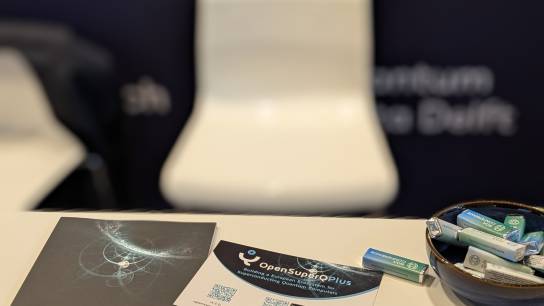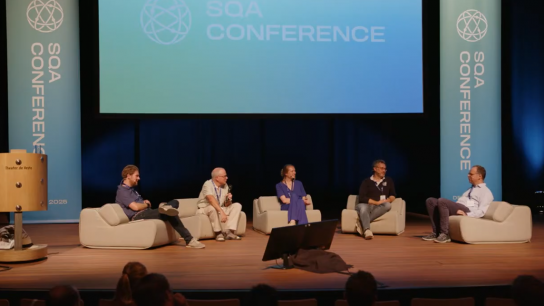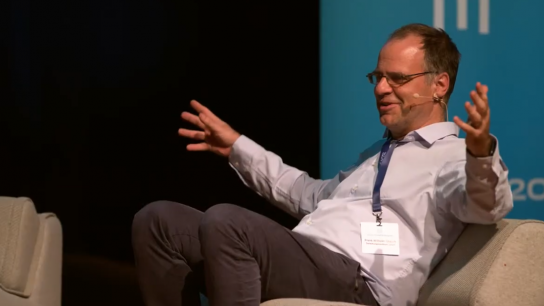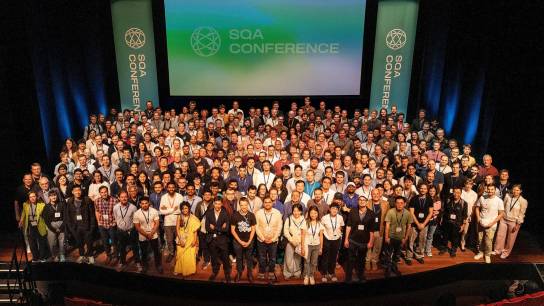OpenSuperQPlus at SQA 2025
The Superconducting Qubits and Algorithms (SQA) Conference took place in Delft from 25–28 August, bringing together more than 350 leading experts from science and industry to explore the full spectrum of quantum technologies. OpenSuperQPlus played a central role in the event’s success: as a Platinum Supporter and through the strong involvement of its members from Delft University of Technology/QuTech, Orange Quantum Systems, IQM Quantum Computers , Walther-Meissner-Institute (WMI), and Forschungszentrum Jülich, who contributed to both the organising team and the scientific committee.
Conference Contributions and Highlights
The OpenSuperQPlus team participated in multiple sessions throughout the conference. One of the programme highlights was the Ask Me Anything session chaired by Adriaan Rol (Orange Quantum Systems). Frank Wilhelm-Mauch (Forschungszentrum Jülich) and Alessandro Bruno (QuantWare) joined this lively exchange as panellists, discussing current innovations in quantum technology and expectations for the future. “When we look at the future of quantum computing we clearly don’t have all the answers – and I am pretty sure we even don’t have all the questions”, noted Frank Wilhelm-Mauch in his closing remarks.
On the second conference day, Alessandro Bruno (QuantWare) chaired a scientific session on materials, fabrication, and devices, addressing topics such as qubit design, reproducibility, and device architectures, while Klaus Liegener (WMI) gave a presentation on quantum simulation and near-term quantum devices.
A session on quantum benchmarking, calibration, and standardisation supported by OpenSuperQPlus was one of the highlights of the third conference day. Hosted by Stefan Filipp (WMI), the panel featured an invited talk by Kristel Michielsen (Forschungszentrum Jülich) on “Benchmarking Quantum Computers.” In addition, Max Werninghaus (WMI) presented his invited talk “The P-Mon – A Protected Three-Mode Qubit” in the session “Coupling and Modelling of Superconducting Qubits.” Contributions also came from Simon Pettersson, who shared insights on superconducting-qubit processors, and Tobias Bonsen (Delft University of Technology), who presented on circuit quantum electrodynamics. On the final day, Anurag Saha Roy (Qruise) shared his ideas on quantum system characterisation and error budgeting. He showed how modern Machine Learning tools can be used to create precise digital models of quantum processors. As part of the day’s later sessions, Frank Wilhelm-Mauch chaired a panel on full-stack systems, quantum gates, and quantum readout. A particular highlight was the invited talk by Leonardo DiCarlo (Delft University of Technology/QuTech) on an open, full-stack architecture for superconducting quantum computing.
Engaging Workshops
In addition to talks and panel sessions, OpenSuperQPlus partners Orange Quantum Systems, QuantWare, Zurich Instruments, and Qruise contributed a series of engaging workshops, further enriching the scientific programme and fostering exchange within the community.
SQA 2025 once again confirmed its role as an important platform for knowledge exchange in the quantum community. With forty-five distinguished speakers and nine workshops, the conference highlighted the diversity, innovative strength, and future potential of quantum technology.
More information about the conference can be found here.
The conference recording is available here.

QSQPlus materials displayed at the SQA conference © SQA Conference I Vivek Sinha

Panellists in discussion during the Ask Me Anything session. From right to left: Frank Wilhelm-Mauch, Alessandro Bruno, Anne-Marije Zwerver, and David DiVincenzo
© SQA Conference I Screenshot from Superconducting Qubits and Algorithms (SQA) Conference 2025 - Day 1, Youtube
QSQPlus Coordinator Frank Wilhelm-Wilhelm Mauch during the Ask Me Anything session
© SQA Conference I Screenshot from Superconducting Qubits and Algorithms (SQA) Conference 2025 - Day 1, Youtube
Group photo of all participants at the end of the conference © SQA Conference